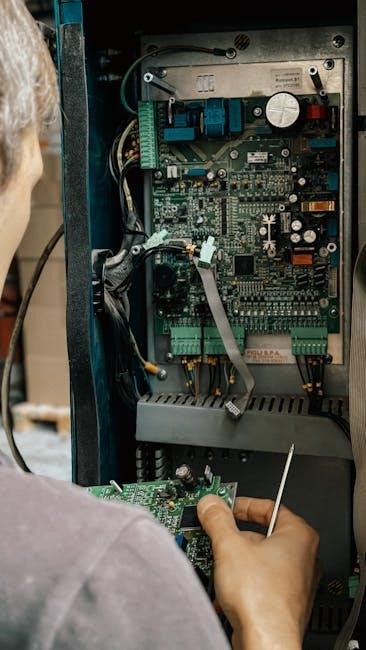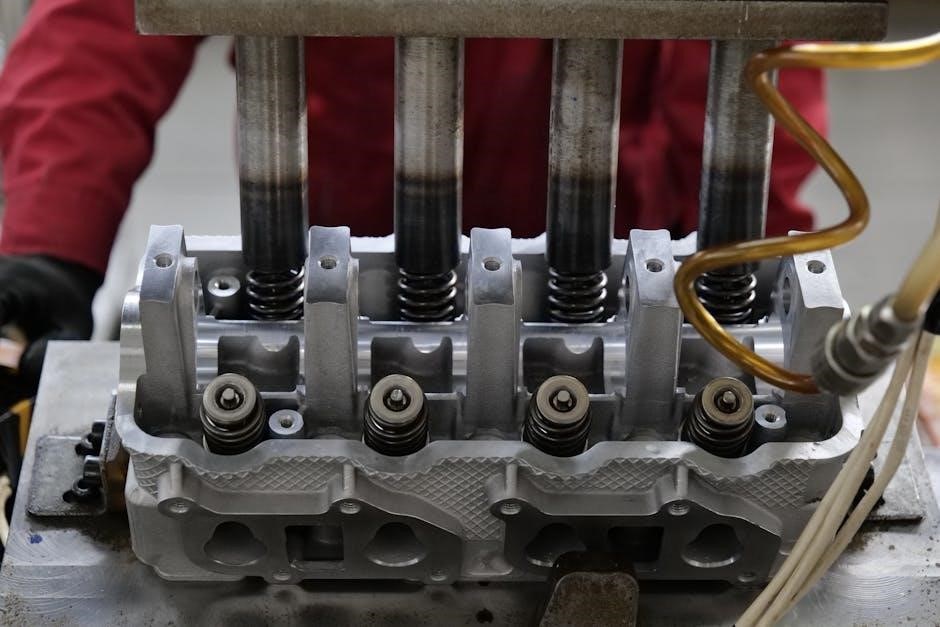2018 toyota camry maintenance schedule pdf

The 2018 Toyota Camry maintenance schedule ensures optimal performance, safety, and longevity. Regular services like oil changes and tire rotations are essential for maintaining warranty coverage and preventing costly repairs. Follow the recommended intervals to keep your Camry running smoothly.
Why Regular Maintenance is Important
Regular maintenance is crucial for ensuring the longevity, reliability, and performance of your 2018 Toyota Camry. It helps prevent costly repairs by addressing potential issues early, maintaining fuel efficiency, and ensuring safety on the road. Following the recommended schedule preserves your warranty and keeps your vehicle running at its best. Neglecting maintenance can lead to premature wear and tear, reducing the lifespan of critical components. By staying on top of routine services, you protect your investment and enjoy a smoother, safer driving experience. Regular checks also help maintain optimal performance, ensuring your Camry operates as intended. Consistency in maintenance is key to avoiding unexpected breakdowns and keeping your vehicle in peak condition.
Overview of the Maintenance Schedule
The 2018 Toyota Camry maintenance schedule is designed to ensure your vehicle runs efficiently and reliably. It outlines recommended services at specific mileage intervals, such as every 5,000 to 10,000 miles for oil changes and tire rotations, and every 15,000 miles for inspections and fluid checks. Major services, like spark plug replacement, are scheduled at higher intervals, such as 30,000 or 60,000 miles. The schedule also includes guidelines for special operating conditions, like frequent towing or driving in dusty environments. By following this structured plan, you can prevent premature wear, maintain performance, and ensure your Camry remains in excellent condition. Regular maintenance helps avoid costly repairs and keeps your vehicle under warranty. Stay proactive with routine checks to enjoy a hassle-free driving experience.
How to Access the Maintenance Schedule PDF
To access the 2018 Toyota Camry maintenance schedule PDF, visit Toyota’s official website or your My Toyota account. You can also download it from the Toyota Owners Portal, where detailed service plans are available. Additionally, authorized Toyota dealerships can provide a copy or direct you to the PDF. Third-party websites like ManualsLib or CarManuals2U may offer free downloads, but ensure the document is authentic. For convenience, forums and automotive communities often share verified links to the PDF. Always verify the source to avoid counterfeit or outdated information. This ensures you have the accurate and official maintenance schedule for your vehicle.

Maintenance Intervals for the 2018 Toyota Camry
The 2018 Toyota Camry requires maintenance at specific intervals, including every 5,000 to 10,000 miles for oil changes, 15,000 miles for inspections, and 30,000 miles for fluid checks.
Every 5,000 to 10,000 Miles
Regular maintenance for the 2018 Toyota Camry is essential to ensure optimal performance and longevity. At every 5,000 to 10,000 miles, key services include oil changes, tire rotations, and fluid inspections. Oil changes help lubricate the engine and prevent wear, while tire rotations ensure even tread wear and improved handling. Fluid checks involve inspecting coolant, brake, and transmission fluids to maintain proper vehicle function. Additionally, the battery and charging system should be tested to avoid unexpected failures. Inspecting belts, hoses, and air filters is also recommended to identify potential issues early. Following these intervals ensures your Camry runs smoothly and maintains its reliability over time. Always consult the official maintenance schedule or your local Toyota dealer for precise recommendations.
Every 15,000 Miles
At every 15,000 miles, the 2018 Toyota Camry requires intermediate maintenance to ensure continued reliability. This interval typically includes a more detailed inspection of key components. Brake system inspection is crucial to check pad wear and fluid levels, ensuring safe stopping power. The drive belts and hoses should also be examined for signs of wear or cracks. Suspension and steering components are inspected to maintain handling and stability. Additionally, the exhaust system is checked for leaks or damage. Replacing the engine air filter is recommended to improve fuel efficiency and performance. These services help prevent potential issues and keep your Camry running smoothly. Always refer to the official maintenance schedule or consult a Toyota technician for precise recommendations.
Every 30,000 Miles

At every 30,000 miles, the 2018 Toyota Camry maintenance involves more comprehensive checks to ensure long-term durability. This service includes a thorough inspection of the vehicle’s belts and hoses, with replacement recommended if signs of wear are evident. The suspension and steering systems are evaluated for proper alignment and function. Brake rotors are inspected for wear, and the parking brake is tested for effectiveness. The exhaust system is checked for leaks, and the fuel system is examined for any issues. Additionally, the battery is tested for charge and connection integrity. These checks help identify and address potential problems early, maintaining your Camry’s performance and safety. Always consult the official maintenance guide or a certified technician for accurate service recommendations.
Every 60,000 Miles
At 60,000 miles, the 2018 Toyota Camry requires more extensive maintenance to ensure continued reliability. This service includes replacing the engine air filter and potentially the in-cabin air filter for improved ventilation. The belts and hoses are inspected for cracks or wear, and replacements are made if necessary. The brake system is thoroughly checked, including rotors and pads, to ensure proper stopping performance. Additionally, the transmission fluid is typically replaced at this interval to maintain smooth gear shifting. The suspension, steering, and exhaust systems are also inspected for any signs of damage or leaks. Following this schedule helps prevent unexpected repairs and ensures your Camry operates efficiently for years to come. Always refer to the official maintenance guide or consult a certified technician for precise recommendations.
Every 90,000 Miles
At 90,000 miles, the 2018 Toyota Camry requires critical maintenance to address wear and tear. Spark plugs should be replaced to maintain proper engine performance and fuel efficiency. The timing belt is typically inspected and replaced if showing signs of wear, as failure can cause significant engine damage. The battery is tested for health and charging capacity, and connections are cleaned. Additionally, the cooling system is inspected for leaks or corrosion, and drive belts are checked for cracks or fraying. Other services may include inspecting engine components like water pumps and pulleys. Following this schedule ensures long-term reliability and prevents major repairs. Always consult the official maintenance guide or a certified technician for precise recommendations.

Key Services Included in the Maintenance Schedule
The 2018 Toyota Camry maintenance schedule includes essential services like oil changes, tire rotations, and brake inspections. Fluid checks, air filter replacements, and spark plug installations are also key components.
Oil Changes and Filter Replacement
Regular oil changes are crucial for the 2018 Toyota Camry to maintain engine health. Synthetic oil is recommended for better performance and fuel efficiency. Oil changes are typically needed every 5,000 to 10,000 miles, depending on driving conditions. The oil filter should also be replaced at these intervals to ensure proper filtration. Clean oil and a fresh filter help prevent engine wear and tear, improving longevity. Always consult the maintenance schedule PDF for precise intervals tailored to your driving habits. Regular oil service is essential for maintaining warranty coverage and preventing costly repairs. Keep track of your oil change history to stay on schedule and ensure your Camry runs smoothly for years to come.
Tire Rotation and Inspection
Regular tire rotation and inspection are vital for maintaining even tread wear and ensuring optimal performance. For the 2018 Toyota Camry, tires should be rotated every 5,000 to 10,000 miles, depending on driving conditions. Inspections should occur during routine maintenance to check for uneven wear, damage, or proper inflation. Proper tire maintenance enhances fuel efficiency, handling, and safety. Refer to the maintenance schedule PDF for specific recommendations tailored to your driving habits. Regular inspections can also help identify potential issues before they become costly repairs. Keeping your tires in good condition ensures a smooth and safe driving experience, while also maintaining your vehicle’s overall performance and longevity.
Brake System Inspection
The brake system inspection is a critical part of the 2018 Toyota Camry maintenance schedule, ensuring safety and reliability. Inspections are typically recommended every 15,000 miles or as needed based on driving conditions. Technicians check brake pads, rotors, calipers, and brake fluid levels during this service. Worn or damaged components are identified and replaced to maintain optimal braking performance. Regular inspections help prevent costly repairs by addressing issues early. Properly functioning brakes are essential for safety, and adhering to the schedule ensures your Camry remains reliable on the road. Always consult the PDF schedule or a certified technician for precise recommendations tailored to your vehicle’s needs.
Fluid Checks and Top-Ups
Fluid checks and top-ups are essential for maintaining the 2018 Toyota Camry’s performance and longevity. During routine maintenance, technicians inspect engine oil, coolant, transmission fluid, brake fluid, and windshield washer fluid levels. Low or degraded fluids can lead to overheating, corrosion, or damage to critical components. The recommended interval for fluid checks is typically every 5,000 to 10,000 miles, depending on driving conditions. Topping up fluids ensures proper lubrication, cooling, and braking functionality. Regular inspections help prevent breakdowns and costly repairs. Always refer to the maintenance schedule PDF or consult a certified technician for accurate recommendations tailored to your vehicle’s needs.
Air Filter Replacement
Air filter replacement is a crucial part of maintaining your 2018 Toyota Camry’s performance and efficiency. The engine air filter should be replaced every 15,000 to 30,000 miles, depending on driving conditions. A dirty air filter can reduce fuel efficiency, lower engine performance, and potentially cause damage to the engine over time. It’s recommended to inspect and replace the air filter during routine maintenance to ensure clean airflow to the engine. Proper replacement involves using a genuine Toyota air filter or an equivalent high-quality alternative. Refer to the maintenance schedule PDF for precise intervals and guidelines to keep your Camry running smoothly and efficiently.
Spark Plug Replacement

Spark plug replacement is essential for maintaining the performance and efficiency of your 2018 Toyota Camry. Spark plugs ignite the fuel-air mixture in the engine and are typically replaced every 30,000 to 120,000 miles, depending on the type and driving conditions. Worn-out spark plugs can cause engine misfires, reduced fuel efficiency, and increased emissions; It’s important to use high-quality spark plugs, preferably genuine Toyota parts, to ensure optimal performance. Timely replacement prevents damage to the engine and maintains smooth operation. Consult the maintenance schedule PDF for specific intervals and guidelines tailored to your vehicle’s needs. Regular spark plug replacement is crucial for preserving your Camry’s reliability and overall driving experience.
Additional Services for Special Operating Conditions
For dusty environments, extreme temperatures, or frequent towing, additional services like air filter replacements and fluid checks are recommended to ensure optimal performance and durability.
Dusty or Polluted Environments
Driving in dusty or polluted environments requires additional attention to maintain your 2018 Toyota Camry’s performance and longevity. Dust and pollutants can damage air filters and other components more quickly. Regularly inspect and replace the engine air filter every 15,000 miles or as needed. Additionally, consider more frequent cabin air filter replacements to ensure clean air circulation inside the vehicle. Dusty conditions may also necessitate extra tire inspections and rotations to maintain even tread wear. Fluid checks should be performed more often to ensure proper lubrication and prevent contamination. Following these recommendations helps protect your Camry from premature wear and ensures optimal functionality in challenging environmental conditions. Always consult your owner’s manual or a certified technician for specific guidance.
Extreme Temperatures

Operating your 2018 Toyota Camry in extreme temperatures requires special attention to maintain performance and prevent damage. In hot climates, ensure the cooling system is regularly inspected and flushed every 30,000 miles to prevent overheating. Engine oil viscosity may need adjustment for optimal lubrication. In cold climates, check battery health more frequently, as extreme cold can drain power. Tire pressure should be monitored, as temperature fluctuations can affect it. Frequent inspections of belts and hoses are also recommended to avoid cracking or failure. Always refer to your owner’s manual for specific guidelines tailored to your environment. Consulting a certified technician can provide personalized advice to protect your Camry from temperature-related wear and tear, ensuring longevity and reliability in extreme conditions.
Frequent Towing or Carrying Heavy Loads
If you frequently tow trailers or carry heavy loads in your 2018 Toyota Camry, additional maintenance steps are required to ensure durability and performance. Regular oil changes should be performed every 5,000 miles to combat increased engine stress. Tire pressure must be checked and adjusted before and after towing to prevent uneven wear and overheating. Brake systems should be inspected every 15,000 miles, as heavy loads can accelerate wear on pads and rotors. Transmission fluid levels should also be monitored and changed as recommended to maintain smooth gear operation. Additionally, the suspension and exhaust system should be inspected for damage or strain. Always consult the maintenance schedule PDF for specific guidelines tailored to your usage patterns to avoid premature wear and ensure your Camry remains reliable under heavy-duty conditions.
How to Read and Understand the PDF Schedule
The 2018 Toyota Camry maintenance schedule PDF provides clear service intervals, symbols for required services, and space to track maintenance history. Use it to stay organized and ensure your Camry remains in top condition.
Navigating the PDF Document
The 2018 Toyota Camry maintenance schedule PDF is structured to guide owners through essential services and intervals. The document begins with a table of contents, allowing quick access to specific sections like mileage-based services or special operating conditions. Each page is divided into clear sections, such as “Every 5,000 to 10,000 Miles” or “Every 30,000 Miles,” making it easy to track required maintenance. Visual icons and color-coded sections highlight critical tasks, while detailed descriptions explain each service. Users can navigate using bookmarks or the search function to find specific information quickly. The PDF also includes a glossary of terms and symbols, ensuring clarity for all readers. This organized format helps owners stay informed and ensure their Camry receives proper care.

Understanding Service Symbols and Codes
The 2018 Toyota Camry maintenance schedule PDF uses standardized service symbols and codes to clearly indicate required tasks. Common symbols include an oil can for oil changes, a tire for rotations, and a battery icon for inspections. These symbols are consistent throughout the document, making it easy to identify services at a glance. Codes, such as “R” for replace or “I” for inspect, are often paired with symbols to provide additional context. A legend or key is typically included in the PDF to decode these symbols and codes, ensuring clarity for all users. Understanding these visual cues helps owners quickly identify necessary maintenance without confusion, ensuring their Camry receives the right care at the right time.
Tracking Maintenance History
Tracking maintenance history is crucial for ensuring your 2018 Toyota Camry remains in optimal condition. The maintenance schedule PDF provides a section for recording completed services, allowing you to monitor progress and stay organized. By documenting oil changes, tire rotations, and other tasks, you can easily verify when services were performed. This record helps maintain warranty coverage and ensures no essential maintenance is overlooked. Additionally, tracking history provides valuable information for future service needs, helping you plan ahead. A well-maintained record also enhances resale value by demonstrating responsible vehicle care. Use the PDF to log each service, ensuring clarity and accountability for your Camry’s upkeep over time.

Cost and Pricing of Maintenance Services
Average maintenance costs for the 2018 Toyota Camry vary, with routine services like oil changes priced between $40-$100. Dealerships may charge more than independent shops.
Average Cost of Routine Maintenance
The average cost of routine maintenance for the 2018 Toyota Camry varies depending on the service. Oil changes typically range from $40 to $100, while tire rotations cost between $20 and $50. Brake inspections are usually $30 to $60, and air filter replacements can be $20 to $40. Spark plug replacements, needed every 30,000 miles, can range from $150 to $300. These costs are general estimates and may vary based on location and service provider. It’s recommended to consult your local dealership or independent shop for precise pricing. Following the maintenance schedule ensures long-term savings by preventing costly repairs and extending the vehicle’s lifespan.
Comparing Dealership vs Independent Shops
When deciding where to service your 2018 Toyota Camry, consider the differences between dealership and independent shops. Dealerships offer certified technicians, genuine Toyota parts, and warranty compliance, ensuring adherence to the maintenance schedule. They may be more expensive but provide peace of mind. Independent shops are often more cost-effective and flexible, with experienced mechanics who may offer personalized service. However, they might not have access to the latest factory tools or parts. Both options can deliver quality work, but dealerships are recommended for warranty-related services and complex repairs. Independent shops are a budget-friendly choice for routine maintenance like oil changes and tire rotations. Choose based on your priorities for cost, convenience, and expertise.

Importance of Following the Schedule
Following the 2018 Toyota Camry maintenance schedule is crucial for preventing costly repairs, maintaining warranty coverage, and ensuring optimal vehicle performance over time.
Preventing Costly Repairs
Regular maintenance is key to avoiding expensive repairs for your 2018 Toyota Camry. By following the recommended schedule, you can identify and address potential issues early, such as worn brake pads or low fluid levels, before they escalate into major problems. Neglecting routine services like oil changes and tire rotations can lead to premature wear on critical components, resulting in costly damage to the engine, transmission, or braking system. Staying on top of maintenance ensures your vehicle runs efficiently and reliably, saving you money and stress in the long run. Consistent care also helps maintain your car’s performance and extends its lifespan.
Maintaining Warranty Coverage

Adhering to the 2018 Toyota Camry maintenance schedule is essential for maintaining warranty coverage. Toyota warranties require regular services, such as oil changes and tire rotations, to remain valid. Neglecting scheduled maintenance can void your warranty, leaving you responsible for repair costs. By following the recommended intervals, you ensure compliance with Toyota’s terms and protect your investment. Proper documentation of maintenance services is also crucial for warranty claims. A well-maintained vehicle not only performs better but also retains its warranty benefits, providing peace of mind and financial protection against unexpected issues. Always refer to your owner’s manual or consult a Toyota service technician for specific requirements.
Ensuring Optimal Performance
Regular maintenance is crucial for ensuring your 2018 Toyota Camry delivers optimal performance. By following the recommended schedule, you can maintain engine efficiency, fuel economy, and overall drivability. Services like oil changes and tire rotations are essential for keeping your vehicle running smoothly. Inspections of brakes, belts, and fluids help identify potential issues before they escalate, preventing unexpected breakdowns. A well-maintained Camry also experiences reduced wear and tear, ensuring consistent power delivery and handling. Over time, this proactive approach enhances reliability and extends the lifespan of your vehicle. Staying on track with maintenance ensures your Camry performs at its best, providing a safe and enjoyable driving experience for years to come.





